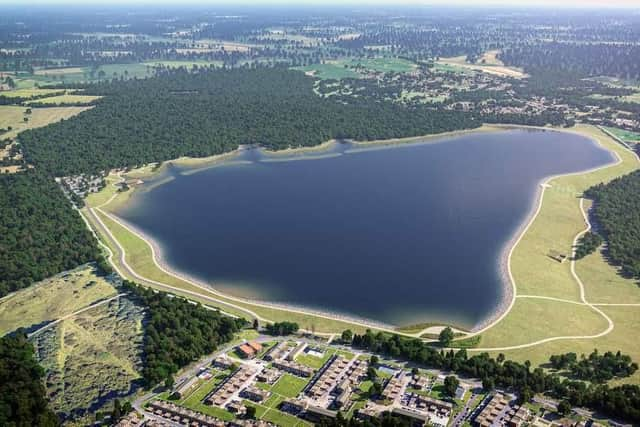Havant Thicket: Clarity sought over ‘contradictions’ for planned water recycling scheme
and live on Freeview channel 276
During a recent meeting of Havant Borough Council, concerns were raised by Ann Buckley from the Havant Borough Residents Alliance regarding contradictory statements about the supply of recycled water to Portsmouth Water customers. The recycling proposal, put forth by Southern Water, involves sending treated wastewater to a recycling facility before pumping it into Portsmouth Water’s approved Havant Thicket Reservoir, pending central government approval.
The controversy stems from previous assurances that the reservoir would be filled with water from the Bedhampton Spring, which has sparked unease among councillors and residents.
Advertisement
Hide AdAdvertisement
Hide AdIn January 2023, when questioned about recycled water supply to Portsmouth Water customers in Havant, water company chief executive Bob Taylor stated: “If the recycling project is approved the mixed water will be supplied to two outlets.


“One of these used on a more routine basis, sends water to use at Farlington water treatment works for further treatment and to supply our Portsmouth Water customers. The other supply will in times of drought deliver a supply to Southern Waters Otterbourne Treatment Works.”
Speaking to full council, Ann Buckley said: “At the overview and scrutiny presentation on the 5th of July 2023 when questioned about Havant residents receiving recycled water, five per cent of the time was mentioned by Bob Taylor.
“Five per cent equates to using the reservoir from Portsmouth Water customers including Havant for approximately 18 days a year.
Advertisement
Hide AdAdvertisement
Hide Ad“Later at the same meeting, Portsmouth Water’s presentation indicated that customers would only receive some recycled water mixed with spring water in drought or emergency scenarios and that Portsmouth Water customers would almost always receive water from the Bedhampton Springs.”
Mrs Buckley highlighted the inconsistencies, raising concerns about the different descriptions provided by Mr Taylor. She directed her question to Cllr Elizabeth Lloyd, asking whether she was also troubled by the conflicting responses.
In response, Cllr Lloyd said that any inconsistencies in information ‘should be clarified’.
“The council expects both Portsmouth Water and Southern Water to be absolutely clear, transparent and consistent with the information they provide to residents and this council.
Advertisement
Hide AdAdvertisement
Hide Ad“And Mrs Buckley, I understand your frustration with this because I myself have received conflicting information from PW’s chief executive.”
In response, Mr Taylor said since the written response in January the company has reviewed how the system would work and the times Portsmouth Water customers would receive recycled water.
He added: “If the water recycling proposals go ahead, Portsmouth Water customers would only receive a mixture of spring water and recycled water from Havant Thicket Reservoir in drought and emergency conditions.
“While our changing climate makes it difficult to predict the frequency and duration of these events, the times customers receive this blended water would be less often than the ‘routine’ scenario mentioned previously.
Advertisement
Hide AdAdvertisement
Hide Ad“At all other times, the situation would remain as it is today, with people’s water supplies coming directly from the Bedhampton Springs, via our Farlington Water Treatment Works.
“The water treatment process allows us to control the taste of customers’ drinking water and we anticipate there would be no noticeable changes if recycled water was included as a source.”
Mr Taylor concluded that all UK water companies have to plan for various future scenarios which take changes to population levels, climate change and water conservation into account. He added that in some scenarios, recycled water could be used ‘more frequently’ from 2040 and beyond.